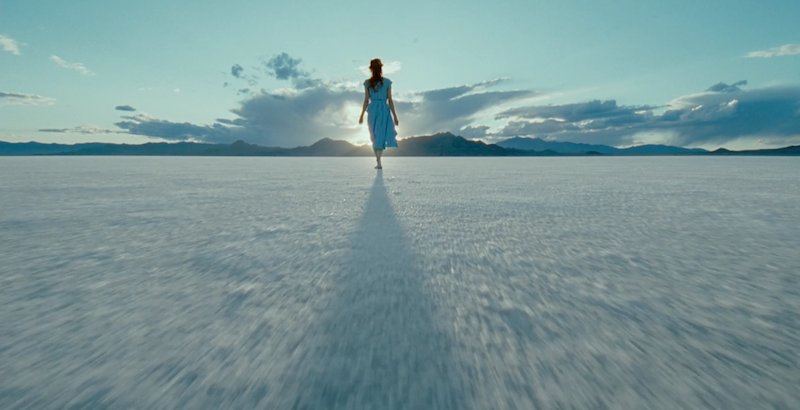"The Tree of Life" and Our Collective Cultural Discomfort with Recognizing "The Glory"
Mary McCampbell
 A few years ago, when preparing notes for a class discussion on Terence Malick’s 2011 film, The Tree of Life, I began to feel very uncomfortable about typing notes and viewing the film simultaneously. I realized that Malick’s film, which pushes the viewer into a disorienting space where he or she must explore what the film’s opening voiceover calls the “two ways to live”—the way of nature and the way of grace—, demanded my complete attention. Watching the film felt like participation in a sacred act, and my rather clinical academic analysis seemed like a violation of sorts. The film is both abstract and concrete as it invites us to consider the relationship between its macro-narrative — God, the creation of the world, and the moral structure of the universe — and its micro-narrative of the O’Brien family as they grapple with questions of suffering, justice, and the knowledge of God. Mr. O’Brien (Brad Pitt) follows the self-serving, purely pragmatic “way of nature,”until he finally realizes that “I dishonored it all and did not notice the glory.”O’Brien learns that, in order to love his family, God, and the creation, he must notice its complexity and allow himself to be ushered into a space of awe and wonder.
A few years ago, when preparing notes for a class discussion on Terence Malick’s 2011 film, The Tree of Life, I began to feel very uncomfortable about typing notes and viewing the film simultaneously. I realized that Malick’s film, which pushes the viewer into a disorienting space where he or she must explore what the film’s opening voiceover calls the “two ways to live”—the way of nature and the way of grace—, demanded my complete attention. Watching the film felt like participation in a sacred act, and my rather clinical academic analysis seemed like a violation of sorts. The film is both abstract and concrete as it invites us to consider the relationship between its macro-narrative — God, the creation of the world, and the moral structure of the universe — and its micro-narrative of the O’Brien family as they grapple with questions of suffering, justice, and the knowledge of God. Mr. O’Brien (Brad Pitt) follows the self-serving, purely pragmatic “way of nature,”until he finally realizes that “I dishonored it all and did not notice the glory.”O’Brien learns that, in order to love his family, God, and the creation, he must notice its complexity and allow himself to be ushered into a space of awe and wonder.
The Tree of Life, a highly conceptual, impressionistic coming of age film focusing particularly on the internal landscape and spiritual journey of son, Jack O’Brien, is also a film that causes its viewers to think about their own relationship with beauty and its ultimate source. Our attentiveness, or lack thereof, to the “glory”of the film tell us something about our own sojourning, about the particular kind of attentiveness, amidst both pain and beauty, that is formative in the development of our own spiritual autobiographies. By forcing his viewers into a sometimes uncomfortable state of confusion, Malick often leads us into a state of wonder.
The film demands patience, contemplation, attentiveness; and these are things that many moviegoers, nurtured on quick and easy Hollywood feel-good formulas, are not ready to give to it. Sociologist and philosopher Theodor Adorno claimed that popular art has been “standardized;”by this, he means that what he called “the culture industry”provides simple, formulaic “art”forms that are created in order to tell us what we want and then sell it back to us. In this sense, we are formed in the image of our culture as we find comfort and false sustenance in these things that we have been trained to think we need and love. Perhaps this is one reason we (the American public) find ourselves so uncomfortable in front of abstraction that cannot be understood immediately.
In a sense, we are culturally trained to become Mr. O’Brien; we learn that the most important things are instant and formulaic, giving us a false sense of fulfillment because they meet one of two goals: increasing our power (through wealth, efficiency, etc.) or entertaining us. These are the standardized norms of mass American culture, and anything that challenges these norms is often simplistically labeled “boring”or “weird.”How fascinating it is that Mr. O’Brien is played by Brad Pitt, the twinkling star of so many mass produced Hollywood flicks. Interestingly, many moviegoers felt led astray, cheated, and angry when seeing this film; they wanted their money back.
But Pitt’s Mr. O’Brien teaches us to be humble in front of the mystery of both beauty and suffering; he teaches us to become like children and re-enter a state of wonder: “I wanted to be loved because I was great; A big man. I'm nothing. Look at the glory around us; trees, birds. I lived in shame. I dishonored it all, and didn't notice the glory. I'm a foolish man.”
